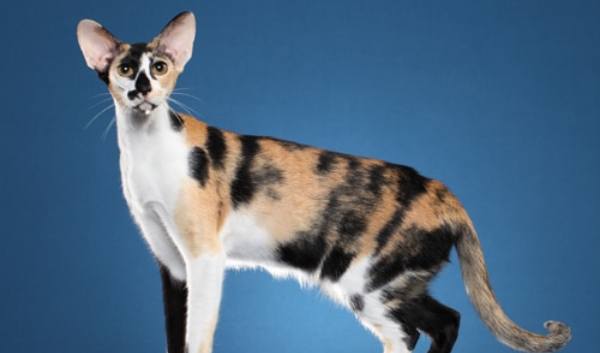Oriental Shorthair Cat Breed Guide: For NZ Cat Owners
With their large ears, sleek bodies, and a rainbow of coat colours, Oriental Shorthairs are one of the most visually striking and vocal cat breeds around. Bred from Siamese stock, they carry the same talkative and affectionate nature—but with far more variety in looks. For New Zealand cat owners seeking an intelligent, energetic, and endlessly curious feline friend, the Oriental Shorthair delivers.
This guide covers everything Kiwi owners need to know about this unique breed—from feeding and training to grooming, socialising, and health management.
Breed Origins & History
The Oriental Shorthair was developed in the UK in the 1950s by breeding Siamese cats with other shorthaired breeds. The goal was to retain the Siamese personality but offer more diversity in colour and pattern. The result? A sleek, fine-boned cat with an endless array of coat variations.
In New Zealand, Oriental Shorthairs are less common but growing in popularity—especially among experienced cat owners who appreciate their outgoing nature and strong bonds with humans.
Appearance & Physical Traits
Coat: Short, fine, and low-shedding
Build: Slender and athletic with a wedge shaped head
Ears: Large and wide-set
Eyes: Almond-shaped, usually green (except for white-coated cats)
Colours: Over 300 colour and pattern combinations—including solid, tabby, tortoiseshell, and more
Oriental Shorthairs are often described as "elegant" and "exotic," with a body built for agility.
Personality & Temperament
Orientals are confident, clever, and extremely communicative. They love being part of every aspect of your life.
- Very vocal (they’ll hold a full conversation with you)
- Loyal and affectionate
- Thrive on attention and dislike solitude
- Quick to learn routines and even tricks
They form strong bonds with their people and do not enjoy being ignored—ideal for households where someone is usually home.
Ideal Environment
Oriental Shorthairs do best in stimulating environments that provide mental and physical outlets.
- High perches and climbing furniture
- Interactive toys, puzzles, and games
- A warm, safe indoor space (they dislike the cold)
- Companionship—either human or feline
They suit indoor living in NZ well, especially in households with lots of activity.
Feeding & Nutrition
Orientals have fast metabolisms and benefit from high-quality, protein-rich diets.
Kittens: Royal Canin Mother & Babycat or Pro Plan Kitten
Adults: Ziwi Peak Air-Dried, Royal Canin Indoor, or Feline Natural
Seniors: Add foods with joint and kidney support as they age
Avoid free-feeding. Stick to scheduled meals to prevent weight issues, and include occasional raw or wet food for hydration.
Grooming & Coat Care
Their fine coat requires minimal grooming:
- Weekly brushing or wiping with a damp cloth
- Occasional nail trimming and ear cleaning
- Regular dental hygiene recommended
Their coat shines naturally and rarely mats, so grooming is quick and easy.
Health Considerations
Oriental Shorthairs are generally healthy but share some traits with their Siamese lineage:
- Progressive Retinal Atrophy (PRA): A degenerative eye condition
- Dental issues: Regular brushing and dental treats help
- Respiratory sensitivities: Keep warm and out of drafts
Choose breeders that screen for genetic conditions, and maintain regular vet checkups.
Flea & Worm Treatment
Even indoor cats need protection in NZ’s temperate climate:
Fleas: - Regular monthly or 3 monthly flea treatment is ideal - Recommended options: Bravecto for Cats, Nexgard Spectra, or Revolution Plus
Worms: - Trea at a minimum 3 month interval - Use Endogard, or Profender Spot-On
Shop PetSupply.co.nz for flea and worm treatments tailored to your cat’s size.
Training & Enrichment
Oriental Shorthairs are highly intelligent and love interactive learning:
Train recall, sit, or fetch with clicker methods
Puzzle toys and food mazes keep their mind sharp
They enjoy leash walks and can be harness trained
Teach them boundaries with consistency and positive reinforcement
Daily enrichment is essential to prevent boredom-related behaviours like yowling or scratching.
Socialisation & Interaction
These cats are extroverts:
- Thrive on daily engagement
- Prefer to be near their people
- Get along well with cat-friendly dogs and other cats
- Dislike being left alone for long periods
If your household is quiet or vacant during the day, consider getting a companion pet.
Is an Oriental Shorthair Right for You?
✅ Great for busy homes where the cat is part of the action
✅ Loves affection, attention, and interaction
✅ Low-maintenance grooming and big personality
❌ Not ideal for people who want an independent or quiet cat
Final Thoughts
Oriental Shorthairs are not for everyone—but for the right owner, they’re unforgettable companions. Curious, playful, and loaded with personality, they thrive in homes where they can be heard, seen, and loved. With the right diet, enrichment, and regular care, your Oriental will bring laughter and loyalty to your life for years to come.
Visit PetSupply.co.nz to explore food, toys, parasite prevention, and more for your Oriental Shorthair.

